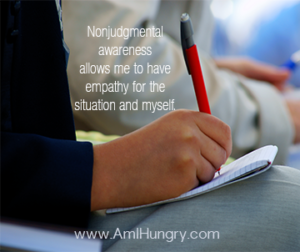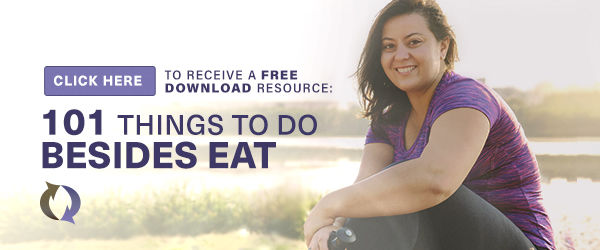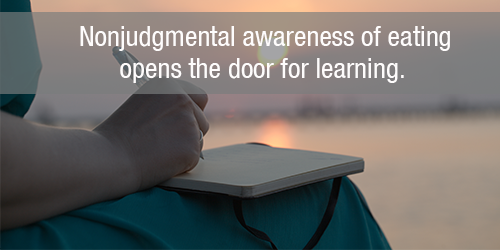Mindful eating is nonjudgmental awareness of the present moment. This awareness allows you to consciously respond to physical sensations, thoughts, and feelings rather than reacting out of habit. When applied to eating, mindfulness creates the space necessary to break though old patterns. Mindful eating can be especially helpful when you are struggling with overeating or binge eating.
Nonjudgmental awareness of eating opens the door for learning
 Nonjudgmental awareness of eating is essential because it provides a more objective understanding of what happened and why, leaving the door open for learning. Guilt just keeps you stuck!
Nonjudgmental awareness of eating is essential because it provides a more objective understanding of what happened and why, leaving the door open for learning. Guilt just keeps you stuck!
One technique for tapping into your awareness is writing about an overeating or binge eating episode afterward. This helps you identify the eating cycles or “voices” that show up. Therefore, you can practice nonjudgmentally recognizing how the Restrictive Eating, Overeating, and Binge Eating voices drive your eating cycles.
This affords you the opportunity to notice and cultivate empathy for the situation and yourself, so you can activate your Self-Care Voice.
Activity: Nonjudgmental awareness of overeating or binge eating
Background: Mindful eating is about bringing nonjudgmental awareness to overeating or binge eating and noticing your choices and experiences. In this activity, you’ll journal about overeating or binge eating to identify the eating cycles that showed up in order to gather the lessons. (This is usually an exercise you’ll do during our Am I Hungry? Mindful Eating for Emotional Eating and Binge Eating Program or Retreat or when you are working with your Mindful Eating for Binge Eating Therapist).
Instructions:
- First read through the example below.
- After an overeating or binge eating episode, write out your own detailed eating experience.
- Then reread what you wrote and identify your eating cycle (Instinctive Eating Cycle, Overeating Cycle, Binge Eating Cycle, Restrictive Eating Cycle).
- Look for and cultivate your Self-Care Voice by interpreting the language and behavior in your experience.
- Meet with your therapist to explore these patterns and cultivate new responses.
Example (actual client; shared with permission):
Although I used to take pride in not eating before noon (Restrictive Eating Cycle), I’ve learned to recognize how this habit sets me up for overeating at lunch. Then I’d deprive myself at dinner as punishment and overeat at night (Overeating Cycle).
Sometimes, the pattern of restriction during the day followed by overeating and guilt would trigger late night binge eating, including a ritual of planning and eating fast food and snacks until I was emotionally numb and painfully full (Binge Eating Cycle).
Using Am I Hungry? skills and tools, I’ve learned how to redirect my mind from restriction by inviting myself to have breakfast (Self-Care Voice) instead of following the old habit. Each time I experience this self-care, I recognize that the old habits really doesn’t serve me anymore and I feel more motivated to continue.
Last week, I chose to eat breakfast with a friend at a local coffee shop in town. While looking over the menu, I watched my mind categorizing good foods/bad foods (Restrictive Eating Cycle), which typically stirs up a rebellious response to the fear of deprivation that comes from telling myself what I “should” eat without considering what I want to eat. I noticed that stubborn part of me beginning to react to feeling deprived.
Aware of this tug-of-war for control, I redirected my attention to identifying my Hunger and Fullness level (Instinctive Eating Cycle). Feeling moderately hungry (I was a “3”), I set an intention to balance eating for enjoyment and eating for nourishment (Self-Care Voice). Then I asked myself, “What do I want? What do I need? What do I have?” in order to carry out this intention (Self-Care Voice).
The conversation with my friend centered on current struggles in her life. I became aware that her problems were triggering some old memories for me. My meal came, and before I knew it, half of my food was gone (Overeating Cycle)! As the unconscious eating registered in my mind, I felt a flush of anger with myself. I said, “You did it again!” with a familiar sharp, judgmental tone (Restrictive Eating Cycle). I noticed the harshness of my thoughts as a wave of emotion jolted me. Then I remembered to use a self-care statement: “Of course I don’t remember eating. I was completely drawn into the conversation and my ability to practice eating mindfully was compromised” (Self-Care Voice). This kind response felt good.
Feeling supported, I was motivated to check in again and notice my body’s Hunger and Fullness level. I recognized that I was not yet full, so I set an intention to feel satisfied at the end of the meal and allow myself to eat as much as my body wanted of the remaining food on my plate (Instinctive Eating Cycle).
I reminded myself, “You’ve practiced eating mindfully before and you’re learning to trust your body to decide when you’re satisfied” (Self-Care Voice). I paid more attention as I selected each bite until my interest in the food began to lessen and I chose to leave the rest (Instinctive Eating Cycle).
I caught a fleeting feeling of smugness about not eating everything on my plate (Restrictive Eating Cycle). Instead of reinforcing that old belief, I reminded myself, “I chose to stop eating because I want to feel good, not because I’m trying to be good” (Self-Care Voice). The smugness was replaced by a feeling of peace. I rechecked my fullness level, which matched my intention, and reinforced that I had stopped eating because my body was satisfied (Instinctive Eating Cycle).
On the way home, I stopped for gas. While paying, I purchased my favorite snack without much thought. As I walked back to the car, I mindlessly opened the package and ate the snack, finishing the last bite as I sat down in the driver’s seat (Overeating Cycle). When I noticed the empty wrapper in my hand, I felt a familiar wave of shame come over me, triggering a sick feeling in my stomach and tension in my body. I thought to myself, “You could go with that feeling and beat yourself up (Restrictive Eating Cycle), or you can be gentle with yourself when you notice those automatic behaviors so you can guide yourself back into the Mindful Eating Cycle.” (Self-Care Voice).
My self-care voice prevailed this time and I was able to use a compassionate tone to ask, “What was happening for me in those moments”? I felt supported and able to piece together the timeline between leaving the coffee shop and paying for gas (Self-Care Voice). I realized that I felt worried about my friend’s problems and was emotionally triggered by the memories our conversation brought up for me. The triggers led my mind directly to food to help me cope with the emotions that I have a hard time feeling.
Until I looked back, I was unaware of the debate going on in my mind at the gas station counter: Should I or shouldn’t I get a snack? The snack won and I realized that I’d unconsciously justified it since I hadn’t cleaned my plate at breakfast. Becoming aware of the whole scene without judgment allowed me to have empathy for the situation and myself: Of course! I was using food to manage uncomfortable feelings. Rather than beating myself up and missing the lesson, using a supportive voice allowed me to make a plan for the next time I’m in a similar situation. I felt hopeful instead of defeated (Self-Care Voice). I laughed and playfully exclaimed, “Darn! I ate that snack so fast, I don’t even know if I enjoyed it!” I felt more relaxed and able to turn my mind to what was next in my day (Instinctive Eating Cycle).
Your turn!
Use nonjudgmental awareness of your eating to write about a recent overeating or binge eating experience. Try to identify your eating cycles and your self-care voice. Share what you learned with your therapist.
Looking for help for binge eating? Check out the Am I Hungry? Mindful Eating for Emotional Eating and Binge Eating Program or Retreat or find a Mindful Eating for Binge Eating Program or Therapist.
This article has been updated from a previously published version.
Enjoyed this article? Here are three more to help you:
A Compassionate Response to Emotional Eating
What is the difference between emotional eating and binge eating?
Binge eating is chaotic eating



4 thoughts on “Nonjudgmental Awareness of Overeating and Binge Eating Cycles”
I always find your articles to be reassuring and directed toward self care and self compassion. They are definitely informative in an academic way. I have shared your website with the WLS clients that I evaluate and counsel. Thank you for all you give.
Thank you for your lovely comment Dr. Bethea! I’m glad our articles and website are helpful to you and your clients!
Comments are closed.